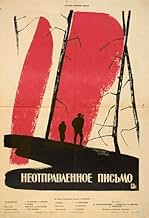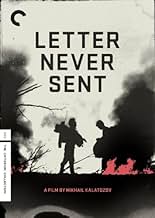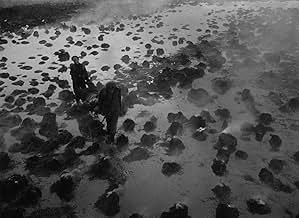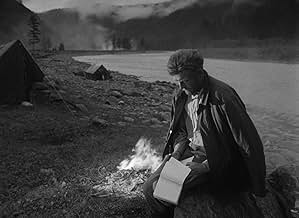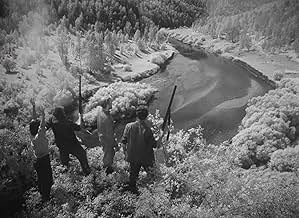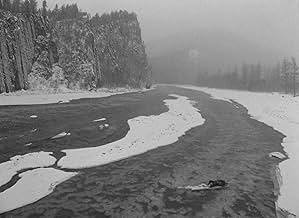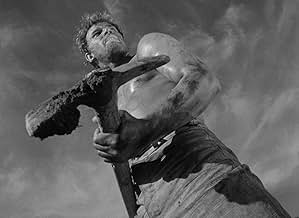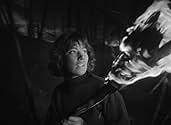ÉVALUATION IMDb
7,8/10
4,7 k
MA NOTE
Quatre géologues recherchent des diamants dans les étendues sauvages de Sibérie.Quatre géologues recherchent des diamants dans les étendues sauvages de Sibérie.Quatre géologues recherchent des diamants dans les étendues sauvages de Sibérie.
- Prix
- 1 nomination au total
Innokentiy Smoktunovskiy
- Konstantin Sabinin
- (as I. Smoktunovskiy)
Tatyana Samoylova
- Tanya
- (as T. Samoylova)
Vasiliy Livanov
- Andrey
- (as V. Livanov)
Evgeniy Urbanskiy
- Sergey Stepanovich
- (as Ye. Urbanskiy)
Galina Kozhakina
- Vera
- (as G. Kozhakina)
Avis en vedette
Stunning cinematography in the Siberian taiga is the highlight here, with scenes like the dramatic/scary forest fire and ice floe accentuated by artistic camera work, including some nifty handheld shots. It's a survival story, one in which a quartet of explorers go out into the rugged wilderness in the hopes of finding diamonds to help the technological advancement of the Soviet state, but find themselves imperiled by the merciless forces of nature. Director Mikhail Kalatozov and cinematographer Sergey Urusevsky made a beautiful film here, one that for the visuals alone made it well worth seeing.
Where the film fell a little short for me was in how forced a couple of its aspects were. The first was the romantic angles, with Tatiana Samoilova and Vasily Livanov playing the two geologists on the mission who are also in love. While that could have added depth to the story and I would watch Samoilova in pretty much anything, the dialogue seemed so inauthentic that it pulled me out of feeling any kind of emotion for the two, or the tension of jealousy from a third man, played by Yevgeni Urbansky. I felt the same way about the titular framing for the story, a letter being composed by the guide (Innokenty Smoktunovsky).
The second aspect that took away from the experience was how heavy-handed the allegory was, with the clear message of perseverance, courage, and sacrifice for the greater good of the Fatherland. This was a story that needed gritty realism in every respect; we get it from the natural elements, but not always with the people, which was unfortunate. Had it been otherwise, this would have been a masterpiece.
Where the film fell a little short for me was in how forced a couple of its aspects were. The first was the romantic angles, with Tatiana Samoilova and Vasily Livanov playing the two geologists on the mission who are also in love. While that could have added depth to the story and I would watch Samoilova in pretty much anything, the dialogue seemed so inauthentic that it pulled me out of feeling any kind of emotion for the two, or the tension of jealousy from a third man, played by Yevgeni Urbansky. I felt the same way about the titular framing for the story, a letter being composed by the guide (Innokenty Smoktunovsky).
The second aspect that took away from the experience was how heavy-handed the allegory was, with the clear message of perseverance, courage, and sacrifice for the greater good of the Fatherland. This was a story that needed gritty realism in every respect; we get it from the natural elements, but not always with the people, which was unfortunate. Had it been otherwise, this would have been a masterpiece.
Among a panoply of scintillating things about this film is Sergei Urusevsky's deft black-and-white cinematography, much of it hand-held. Urusevsky seems to understand semiotics deeply, and his shots are often protean, shifting angle or perspective during a take to wring extra emotional import from it. I found myself rewinding many sequences and rewatching because of how well Urusevky, arguably the greatest Soviet era lensman, can minimally change vantage or tilt and bring fresh meaning cascading from the actors.
"Letter Never Sent" has communistic political messages in it, but is sumptuously acted by a small cast with a good sense of ensemble. Heat and cold, fire and ice, land and water, remote wildness and safe civilization all exist here in dynamic tension. The version in digital circulation is lovingly restored. A must-watch, especially for admirers of other quintessential Russian filmmakers such as Tarkovsy.
"Letter Never Sent" has communistic political messages in it, but is sumptuously acted by a small cast with a good sense of ensemble. Heat and cold, fire and ice, land and water, remote wildness and safe civilization all exist here in dynamic tension. The version in digital circulation is lovingly restored. A must-watch, especially for admirers of other quintessential Russian filmmakers such as Tarkovsy.
Saw this at Tribeca Film Festival in Spring 2007, and was absolutely floored. I walked out of the theater afterword amazed at what I'd seen and thrilled that such an amazing film existed and had been maintained by a tiny number of appreciators in such excellent quality for so long.
The story is not the strong point of the movie. Rather, as with Terence Malick films, the story is just a starting point for the film, which is another beast entirely. What shines and carries the film from scene to scene is the cinematography. I didn't know if this was happened elsewhere at the time, but I didn't expect to see hand-held camera work in a 1959 Russian film, let alone the kind of early spinning, impossibly-filmed shot that appears early in the film. Later, there is a sequence that makes me long to know how they created the opportunity to film in such conditions.
If you've read this far, you must track down this movie. My understanding is that Francis Coppola has a California archive maintain the only copy in the Americas, and that it's usually shown just one a year.
The story is not the strong point of the movie. Rather, as with Terence Malick films, the story is just a starting point for the film, which is another beast entirely. What shines and carries the film from scene to scene is the cinematography. I didn't know if this was happened elsewhere at the time, but I didn't expect to see hand-held camera work in a 1959 Russian film, let alone the kind of early spinning, impossibly-filmed shot that appears early in the film. Later, there is a sequence that makes me long to know how they created the opportunity to film in such conditions.
If you've read this far, you must track down this movie. My understanding is that Francis Coppola has a California archive maintain the only copy in the Americas, and that it's usually shown just one a year.
Having just directed the WWII-themed masterpiece "The Cranes Are Flying", Mikhail Kalatozov directed "Neotpravlennoye pismo" ("Letter Never Sent" in English), a look at the will to survive in desperate circumstances. A group of geologists collecting diamonds in Siberia have to fend for themselves when a forest fire cuts them off from their supplies. Their cooperation was probably meant to reflect Soviet values.
I interpreted the final few minutes of the movie as a reflection of the man's desperation (he wanted there to be something). But however you interpret it, this has to be one of the most intense movies that I've seen. And I highly recommend it.
I interpreted the final few minutes of the movie as a reflection of the man's desperation (he wanted there to be something). But however you interpret it, this has to be one of the most intense movies that I've seen. And I highly recommend it.
A quite ridiculous film about diamond hunters in Siberia by the extraordinary director/cinematographer team of "I Am Cuba" and "The Cranes Are Flying." Needless say, the camerawork in the bizarrely surreal and barren Siberian locations is UNBELIEVABLE (the continuous takes are longer than any other film in history except for "I Am Cuba") but the film itself is too directly tied to dramatic 'adventure story' conventions to transcend into pure poetry like "Cranes" and "Cuba." There is a spectacular scene shot with the main actors amidst a raging forest fire and another one shot during an ice-storm. Most definitely worth transferring to DVD (there isn't a true film fan that wouldn't be flabergasted by the cinematography) but not by the same ones (Hen's Tooth) who did such a mediocre job on the transfer of "I Am Cuba."
Le saviez-vous
- AnecdotesIn 1995 the film was restored by and shown in United States upon the financial support from Francis Coppola.
- Citations
Andrey: Sergei, you've fallen in love with a girl who loves someone else, and that man loves her. From the moral standpoint it's wrong.
Sergey Stepanovich: I don't give a damn about your bookish morale. I'm in love.
Andrey: That's an egoist speaking.
- ConnexionsFeatured in Fejezetek a film történetéböl: A szovjet film 1953-1970 (1990)
Meilleurs choix
Connectez-vous pour évaluer et surveiller les recommandations personnalisées
- How long is Letter Never Sent?Propulsé par Alexa
Détails
- Date de sortie
- Pays d’origine
- Site officiel
- Langue
- Aussi connu sous le nom de
- Letter Never Sent
- Lieux de tournage
- Mosfilm Studios, Moscou, Russie(Studio)
- société de production
- Consultez plus de crédits d'entreprise sur IMDbPro
- Durée1 heure 36 minutes
- Couleur
- Mixage
- Rapport de forme
- 1.37 : 1
Contribuer à cette page
Suggérer une modification ou ajouter du contenu manquant

